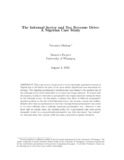| dc.description.abstract | There has been a recent need to boost internally generated revenue in Nigeria due to the fall in the price of oil, upon which Nigeria has been dependent for revenue. The Nigerian government's attention has been drawn to the massive size of the informal sector from which little or no taxes are being collected. To resolve this discrepancy, it plans to introduce a presumptive tax regime aimed at taxing the firms in the informal sector. In this paper, I analyze the effect of different presumptive taxation policies on the size of the informal sector, tax revenue, output and welfare. Results show that an assessment in the form of proportional presumptive tax seems to be more efficient than a uniform lump-sum presumptive tax. However, I also show that in certain cases, the optimal policy for a government that cares about inequality would be a proportional presumptive tax with size-based "tax holiday" for informal firms who operate with less than a prescribed capital threshold. | en_US |

